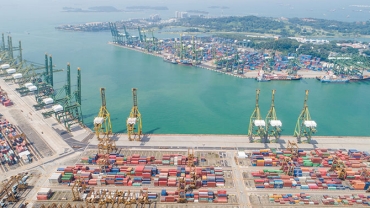
Transitioning to a new customs declaration system
Customs declaration systems are the backbone of international trade, ensuring compliance with customs regulations and facilitating the smooth flow of goods across borders. As technology continues to advance, customs authorities around the world are transitioning from legacy systems to more efficient and more automated electronic system that comply with laws, rules and regulations. Recent examples of new systems in the Netherlands are the Customs Declaration Management System (in Dutch: ‘Douaneaangiften Management Systeem’ or ‘DMS’) for filing import and export declarations and the Customs Transit Application (in Dutch: ‘Douane Vervoer Applicatie’ or ‘DVA’) for filing transit declarations.

The challenges of transitioning
When transitioning to a new customs declaration system there are always challenges that need to be addressed. PwC, as a global leader in professional customs & international trade and technology services, can provide valuable assistance in transitioning to a new customs declaration system like DMS or DVA. We use a solid step-by-step approach, paying attention to:
- Mapping requirements: Customs requirements need to be translated into technical configuration for a smooth migration to a new system. PwC’s customs and international trade specialists have extensive expertise of customs requirements and have a strong track record in translating the requirements for a customs declaration system to new or existing customs filing software used by businesses. This of course in addition to the in-dept technical customs and trade knowledge, that will ensure a transition that also complies with the legal requirements.
- Technical Complexity: Implementing or updating customs software to connect to a new customs declaration system requires technical expertise and resources. It involves data migration, system integration, and ensuring compatibility with existing infrastructure. PwC's technology experts have in-depth knowledge of customs software systems and can provide guidance on system selection, integration, and customization.
- Training and Change Management: Transitioning to a new system requires training employees on how to use the new platform. Change management strategies need to be developed to ensure smooth adoption and minimize disruptions. PwC understands the importance of change management in successful system transitions. They can develop change management strategies, provide training, assist with updating processes and procedures which will support a smooth adoption and use of a new declaration system.
- Stakeholder Engagement: Successful migration to a new system requires collaboration and engagement with various stakeholders, including customs authorities, traders, and technology providers. Effective communication and coordination are essential for a smooth transition. PwC's global presence and industry knowledge enable them to facilitate effective communication and collaboration among customs authorities, businesses, and technology providers.
With PwC's expertise and support, the transition to a new customs declaration system can be smooth and successful. PwC's tailored solutions and global experience can help businesses navigate the complexities and challenges associated with the transition.
Lessons learned
Every system transition has its own challenges, but also opportunities. However, there are some general lessons learned based on our experiences with system transitions in the past couple of years.
- Different customs software: PwC has extensive experience with system transitions facilitated by various customs software solutions. Even the same system transition, like the migration to DSM in the Netherlands, can be completely different depending on the customs software solution. Where for example one software provider will act proactively and update his system to the new requirements, another software provider will change nothing at all and it’s up to the business to configure the required changes. PwC tailors its way of working depending on the business and the customs software solution in place.
- Knowing your business: PwC invests in getting to know your business and supply chain, to ensure they really know what is important for you. PwC strongly believes that this knowledge and relationship is key for a successful transition.
- Master Data changes: It is very important to do a thorough Master Data (re-)assessment, as different data elements might be (and will be) required to be populated in the new customs system. Part of getting to know your business is learning about your Master Data. Based on the existing Master Data and the expertise on data requirements, PwC assesses which data elements need to be changed, added or removed.
- Testing: Testing the right scenarios is a key element for a successful migration. PwC knows which scenarios are important and should not be forgotten. Based on the knowledge of your business and supply chain, PwC makes sure all relevant scenarios (and not only the ‘happy’ scenarios) are sufficiently tested before go-live.
- Training: When migrating to a new system, there are always processes that will change. Teams and employees working in a customs software solution need to be trained properly to work in the new system. This is a key element to guarantee compliance after the transition. PwC is specialized in providing training to businesses to explain what has changed, which data fields are mandatory, which data needs to be populated in a field, etc. But at least as important, PwC explains why certain elements have changed and what the consequences are if new requirements are not met.
- Contact with Customs: PwC builds good relationships with Customs authorities involved, which will help in case potential issues arise. That these can be addressed more easily, and answers are generally received faster.
Always compliant
The transition to a new customs declaration system, such as DMS or DVA in the Netherlands, is mandatory but always comes with challenges that are different for each and every business. By leveraging the technical capabilities, in-dept customs and trade knowledge as well as expert guidance from PwC, businesses can smoothly transition to using the new system. The successful implementation will contribute to seamless trade operations and continuous compliance.

Contact us


Stan Vullers
Senior Manager Customs & International Trade, PwC Netherlands
Tel: +31 (0)62 059 05 39

















